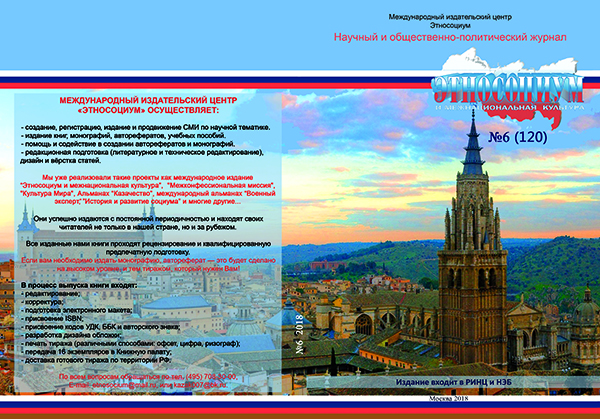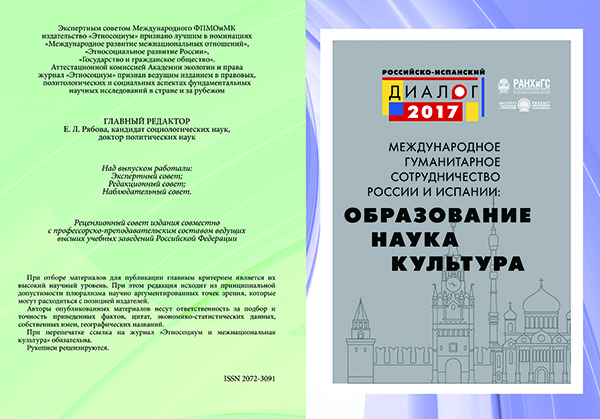

Content
|
COUNCIL OF INTERNATIONAL RELATIONSHIP
|
|
|
Shulga E.P., Medvedev V.V. Students of the polyetnic city: adaptation, identity, self-determination
|
9
|
|
Ryabova E.L., Ternovaya L.O. Russia-Spain: multifaceted interaction and learning opportunities for each other
|
15
|
|
ACTUAL PROBLEMS OF MODERN SOCIETY:
POLITICS, ECONOMICS, LAW
|
|
|
Bocharov Y.B. The problem of interrelations between the voter and the deputy in the consequence of legislative limitations of the electoral process outside the territory of the Russian Federation
|
51
|
|
Groot Waldemar Modernization of public administration in the context of global integration
|
32
|
|
Miguleva M.V. History of the definition of the concept of "cyberspace"
|
41
|
|
REGIONAL STUDY:
POLITICS, ECONOMICS, LAW
|
|
|
Andreev A.V. Presidential elections in Russia in 2018: strategy of controlled re-politicization and resonance effects
|
47
|
|
Shestov S.N. The documentation as a research tool of the public events
|
56
|
|
Agashev D.V. Alimentariness as a factor of the systemic nature of social security law
|
64
|
|
INTERNATIONAL RELATIONSHIPS:
POLITICS, ECONOMICS, LAW
|
|
|
Gordeev A.V. The evolution of national policy in Western Europe on the example of Spain
|
83
|
|
Idahosa S.O., Abidoye R.O. Game theory analysis on the Korean peninsula: a narrative on North Korea – United States conflict
|
92
|
|
Tambi S.A. Pavel Lazimir: the Estonian at the head of the October revolution’s tactical headquarters in 191
|
102
|
|
Li Eryong, Li Yukun Expressiveness of the performance in music art: commonality and individuality
|
118
|
|
China and Russia: State Development Strategies
|
128
|
|
Digital Leadership
|
133
|
|
Russian Ethnographic Museum
|
135
|
|
REVIEW
|
|
|
Voznesenckiy I.S. Crimea: geo-economics vs geopolitics
|
137
|
|
NEWS
|
|
|
Zorin V.U. National Conflicts
|
143
|
|
Abstracts
|
154
|
|
Authors
|
157
|
|
Requirements to materials submitted to the international publishing house "Etnosocium"
|
161
|
The relevance of article is defined by requirements and a condition of the modern Russian society which characterized by ethnic, cultural, confessional and linguistic diversity. Knowing and understanding of the existing polietnic and polycultural environment by student's youth in many respects promote determination of own ethnic identity.
Keywords: identity, student community, university, adaptation, youth.
The "soft power" of the state is called the form of its foreign policy strategy, which presupposes the ability to achieve results on the basis of voluntary participation, sympathy and attractiveness. Education, culture, intellectual exchanges serve as means of "soft power". Its manifestations may have as its goal not just the rapprochement of countries, but the establishment of the dominance of one model over another. But there are also possible beneficial effects for both sides of the "soft power". An example of humanitarian cooperation between Spain and Russia confirms this. It has a long history, and now it is actively developing in the field of education, culture, and tourism.
Keywords: international relations, Spain, Russia, history, "soft power", humanitarian cooperation.
The article deals with the differences in the organization of the electoral process in the federal authorities of the Russian Federation outside its territories, because of which a part of the voting rights of citizens permanently residing abroad is infringed. It also notes the existence of restrictions for candidates for deputies in conducting their election campaign abroad and for elected deputies of the State Duma in their work with "foreign" voters.
Keywords: elections, suffrage, foreign countries, turnout, voter, deputy, State Duma.
Within this paper analyzes the conceptual modernization of public administration in terms of global integration, concepted content modernization, studied its effect on the relationship between the conditions, specified level, and forms of public administration modernization.
Keywords: transformation, modernization, modernization of public administration, globalization, globalization or processes, revolution, modernization, national state.
It is described a new phenomenon of modernity in the article, it is reflected the history of the definition of the concept of “cyberspace”. A comparative analysis of definitions of the concept of cyberspace from domestic and foreign sources is conducted. As a result of the research, the author specifies the definition of cyberspace taking into account the social aspect. Cyberspace is a socio-technical reality which consists of different levels.
Keywords: cyberspace, virtual reality, Internet, social and technical aspects.
Political resonances are considered by the author as one of the key means of forming public opinion. Public space is a special socio-political phenomenon, understood as a system of reproduction of significant political discourses, forming the basis of the current political order. In turn, the author considers the elections as a mechanism of actualization of political discourses and as a significant resonant event, which leads to the mechanism of feedback and legitimacy of the status of regional power. The publication analyzes the content and nature of the presidential election campaign of 2018 in Russia, analyzes its results and possible political consequences. The difference between the last election campaign and the presidential elections of 2012 is shown. The past elections are considered by the author in the context of the process of controlled re-politicization of the Russian society, in which the technology of formation and management of political resonances become particularly important in the context of the overall increase in the efficiency of the system of state and political governance.
Keywords: presidential elections, political discourse, political resonances, resonant event, feedback, re-politicization.
The research aspects of the documentation of the events by the public commission have been considered. The technology of documentation has been optimized on the information criterion. It has been shown that the results of documentation become important for the state administration, as well as for the international judicial instances. The work of the public commission has been included in the system of the state and public activity. Using the examples of the formation practice of the self-declared social state the necessity of special knowledge application in the documentation of the social events has been confirmed.
Keywords: social state, documentation, public commission, technology, special knowledge.
The article is devoted to the analysis and evaluation of quantitative indicators (standards) of the level of social security for people in need in the light of the concept of social security, as well as the reflection of its influence on the sectoral system and structure. In work the author offers an updated look at the essence of the category of social security. the necessity of theoretical rethinking and the return of this concept to the branch doctrine, its use as a functional legal means is substantiated. It is emphasized that the concept of social security is based on the presumption of standardization of the basic human needs in a certain state of need, which are standardized by the state in view of reasonable sufficiency and are met at the expense of social security funds. The system of basic legal indicators of normalized (alimentary) needs that directly or indirectly contains each material institution of the social security law is modeled and justified. The conclusion is made that social alimentation is a system-forming factor in the sectoral system, providing an organic link between the norms of the General and Special Parts of the industry, thereby determining the relative amount of subjective rights of needy citizens for the projected level of living.
Keywords: social security law, legal system, concept of alimentariness, social security standards, social alimentation, standardized needs, system-forming factor, consumer basket.
The article deals with the evolution of Spanish national policy, presents the main examples of conflict regionalism. Modern separatism of Western Europe in General, and in Spain in particular, has common features: the connection with the idea of a special ethno-regional fate, antiethatism (rejection of the dominant state and its history), ethnocracy, politicization of regional identity, the desire to get mass support of the regional community.
The task of the study is to investigate the evolution of national policy in Western Europe on the example of Spain.
The article is based on the use of approaches and methods of many Sciences: philosophy, political science, theory of international relations, conflictology, law, etc.
The results can be used in further studies of nationalism in international relations, including the ethnonational dimension of international conflicts. Materials and conclusions of the work will help in the development of special courses for such scientific disciplines as political science, theory of international relations, country studies, public administration, etc.
It is determined that nationalism should be considered as a social process associated with the formation of the nation, in which the national consciousness and its constituent part – the ideology of nationalism, as well as the activities of political forces that use it.
Catalonia and the Basque Country are the most striking examples of regional separatism in Spain. The history of the origin of nationalism and separatism in history is considered.
It is established that the reasons that the nationalists put forward in the foreground when demanding independence can be divided into historical, economic, cultural.
The socio-economic factors of Spain's national policy include a combination of economic changes and the existence of social contradictions in the history of the Spanish regions.
Keywords: Catalonia, Basque Country, Spain, nationalism, regional inequality.
Game theory studies decision making by various parties in conflict or in a potential conflict taking into account the decisions made by the parties in such interactive environments. The paper therefore examines the tension in the Korean Peninsula through the lens of game theory. It analyzes the character and nature of the tension, vis-a-vis the current tension between the United States and North Korea using game theory as a tool. It also assesses the role of actors involve in it. Methodologically, it employs the use of descriptive analysis relying solely on secondary information for data generation and articulation. It thus, recommends that China will need to share responsibility for a diplomatic campaign seeking peaceful solution. And there should be a concerted effort by China to join the US, South Korea, Japan and the United Nations to deliver a credible and strengthened deterrence to North Korea against any further nuclear development.
Keywords: Game theory, nuclear weapon, North Korea, United States, Nuclear threat, Korean Peninsula.
Pavel Lazimir, the Estonian from St. Petersburg, headed in 1917 the Petrograd Military Revolutionary Committee - extraordinary institutional body of proletarian power engaged in the preparation and carrying out the October Revolution. The aim of this study is to determine the role of P. Lazimir in the October events of 1917. The author tells about little-known facts of P. Lazimir's biography. The study is relevant in the context of highlighting relatively unknown by the wide audience biography of the political leader.
Keywords: Estonians, Petrograd, Pavel Lazimir, revolution, SRs, Bolsheviks.
In the questions of evaluating the expressiveness of a music performance the artistic level of it plays an important role, presumably the technique of a performer and his/her following to the rules of art during a stage performance. The present article contains the analysis of expressiveness of the music performance regarding both tradition and individuality in it. The author stresses the shift from the aesthetic concept of performance with a focus on a piece of music to the aesthetic concept of revealing new aspects of a music piece during its representation on the stage.
Keywords: expressiveness of the performance; music performance; tradition and individuality.
In Ludmila Ternovaya's monograph "The Genius of the Place of the Crimea: the Unity of Geopoetics and Geopolitics" the problems of the cultural and historical heritage of the Crimea are viewed in the foreshortening not only of a special civilizational code, which is read in different ways in different regions, but also allows to understand the power of their geopolitical attraction. At the same time, the geocultural code of the Crimean peninsula contains basic economic elements. This allows us to talk about the unity of geophysics, geopolitics and geo-economics of the Crimea.
Keywords: geopolitics, geoeconomics, culture, historical heritage, Crimea, economic forums.